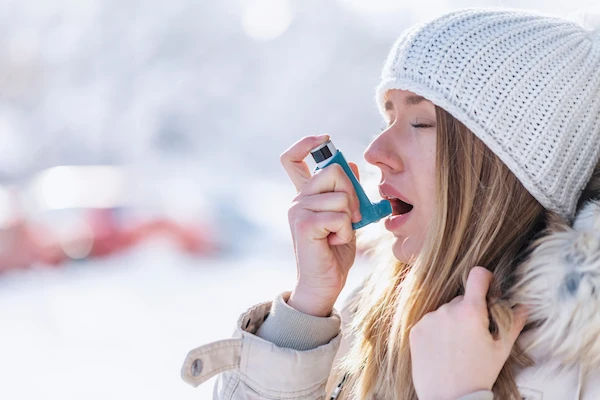Winter Asthma: Understanding Symptoms and Treatment
Discover how cold weather affects asthma and learn to manage winter asthma symptoms effectively. Explore common triggers, treatment options, and tips to breathe easier during the colder months.


Winter can be a beautiful season, but for people with asthma, the cold weather can bring challenges. If you or a loved one experiences worsening asthma symptoms during winter, you’re not alone. Cold, dry air and seasonal illnesses can trigger asthma flare-ups, making breathing difficult.
In this article, we’ll explore what winter asthma is, its symptoms, causes, and how to manage it effectively. With the right precautions, you can enjoy the season while keeping your asthma under control.
What Is Winter Asthma?
Winter asthma refers to the worsening of asthma symptoms during colder months. Asthma is a chronic lung condition where the airways become inflamed, narrow, and produce extra mucus, making breathing difficult. Cold air, indoor allergens, and respiratory infections common in winter can aggravate these symptoms.
Consult a Top Pulmonologist
Common Symptoms of Winter Asthma
If you have asthma, you may notice these symptoms getting worse in winter:
- Shortness of breath – Feeling like you can’t get enough air.
- Wheezing – A whistling sound while breathing.
- Coughing – Especially at night or early morning.
- Chest tightness – A feeling of pressure or discomfort in the chest.
- Increased mucus production – Leading to congestion.
If these symptoms become severe (such as extreme difficulty breathing, bluish lips, or inability to speak properly), seek emergency medical help immediately.
Why Does Asthma Worsen in Winter?
Several factors contribute to winter asthma flare-ups:
1. Cold, Dry Air – Breathing in cold air can irritate the airways, causing them to tighten.
2. Indoor Allergens – Spending more time indoors exposes you to dust mites, mold, and pet dander.
3. Respiratory Infections – Colds, flu, and other infections can trigger asthma attacks.
4. Increased Air Pollution – In some areas, winter air pollution (smog, smoke from heaters) worsens asthma.
5. Less Physical Activity – Reduced outdoor activity can sometimes weaken lung function.
How to Manage Winter Asthma Effectively
While winter can be tough for asthma patients, these tips can help you stay healthy:
1. Keep Warm and Protect Your Lungs
- Wear a scarf or mask over your nose and mouth when going outside to warm the air before breathing it in.
Avoid sudden exposure to cold air—breathe through your nose instead of your mouth.
2. Stay on Top of Medications
- Use your preventer inhaler (usually a steroid inhaler) as prescribed to reduce inflammation.
- Keep your reliever inhaler (like albuterol) handy for sudden symptoms.
- If you have allergies, antihistamines or nasal sprays may help.
3. Maintain a Clean Indoor Environment
- Use a humidifier to keep indoor air moist (but clean it regularly to prevent mold).
- Vacuum and dust frequently to reduce allergens.
- Wash bedding in hot water to kill dust mites.
4. Avoid Triggers
- Stay away from smoke (fireplaces, cigarettes) and strong chemical fumes.
- Get a flu shot to prevent respiratory infections.
- If exercising outdoors, warm up first and consider indoor workouts on very cold days.
5. Stay Hydrated and Eat Healthy
- Drink plenty of water to keep mucus thin.
- Eat foods rich in vitamin C (citrus fruits, bell peppers) and omega-3 (fish, flaxseeds) to support lung health.
When to See a Doctor
If your asthma symptoms are not well-controlled despite medication, or if you experience frequent flare-ups, consult a doctor. You may need:
- An adjustment in your asthma action plan.
- Allergy testing to identify triggers.
- Additional treatments like long-acting bronchodilators or biologics.
Need Help? Book a Consultation Today!
If winter asthma is troubling you, don’t wait. Apollo 24|7 offers expert consultations with pulmonologists who can help manage your asthma effectively. You can also book lung function tests or allergy screenings for a thorough check-up.
Final Thoughts
Winter asthma can be challenging, but with the right precautions, you can keep symptoms under control. Stay warm, take your medications as prescribed, and avoid triggers to enjoy the season without discomfort. If symptoms persist, don’t hesitate to seek medical advice.
Consult a Top Pulmonologist
Consult a Top Pulmonologist
Dr. Bhargavi Koppolu
Pulmonology Respiratory Medicine Specialist
6 Years • MBBS, MD (Pulmonology )
Visakhapatnam
Apollo Hospitals Ramnagar Vizag, Visakhapatnam

Dr Abhishek Verma
Pulmonology Respiratory Medicine Specialist
5 Years • MD (Respiratory Medicine), PDCC (Interventional Pulmonology) Alumni SGPGIMS & KGMU Lucknow
Lucknow
Apollomedics Super Speciality Hospital, Lucknow
(50+ Patients)

Dr Chetan Kumar
Pulmonology Respiratory Medicine Specialist
27 Years • MBBS, MD TB & CHEST DISEASE
Delhi
Cronus Hospital, Delhi

Dr. Krishna Ramanathan
Ent Specialist
10 Years • MBBS DNB
Bengaluru
Apollo Clinic, JP nagar, Bengaluru
Dr. Naseeha Mohammed S V
Pulmonology Respiratory Medicine Specialist
6 Years • MBBS, MD ,DNB Respiratory Medicine
Bengaluru
Apollo Clinic, Sarjapur Road, Bengaluru
Consult a Top Pulmonologist
Dr. Bhargavi Koppolu
Pulmonology Respiratory Medicine Specialist
6 Years • MBBS, MD (Pulmonology )
Visakhapatnam
Apollo Hospitals Ramnagar Vizag, Visakhapatnam

Dr Abhishek Verma
Pulmonology Respiratory Medicine Specialist
5 Years • MD (Respiratory Medicine), PDCC (Interventional Pulmonology) Alumni SGPGIMS & KGMU Lucknow
Lucknow
Apollomedics Super Speciality Hospital, Lucknow
(50+ Patients)

Dr Chetan Kumar
Pulmonology Respiratory Medicine Specialist
27 Years • MBBS, MD TB & CHEST DISEASE
Delhi
Cronus Hospital, Delhi

Dr. Krishna Ramanathan
Ent Specialist
10 Years • MBBS DNB
Bengaluru
Apollo Clinic, JP nagar, Bengaluru
Dr. Naseeha Mohammed S V
Pulmonology Respiratory Medicine Specialist
6 Years • MBBS, MD ,DNB Respiratory Medicine
Bengaluru
Apollo Clinic, Sarjapur Road, Bengaluru




